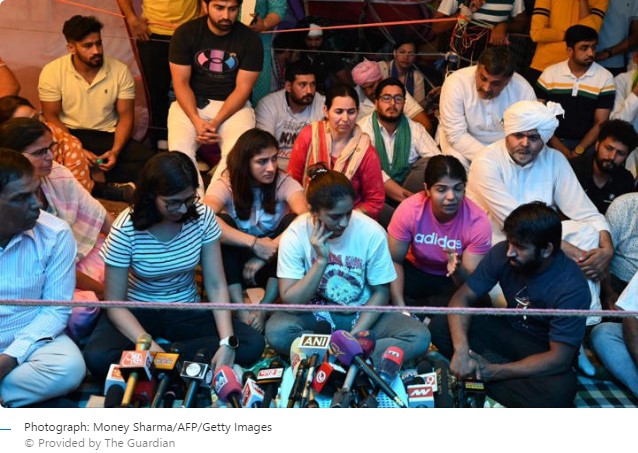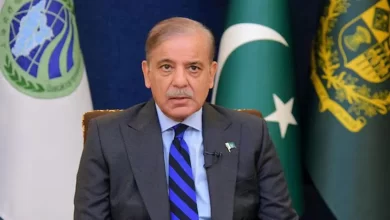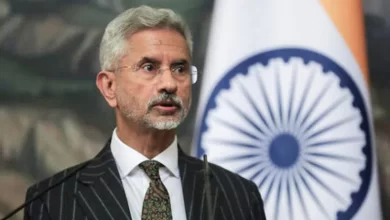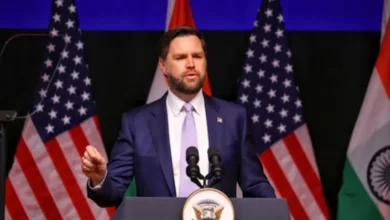India’s female wrestlers threaten to hand back Olympic medals in harassment row

They were the first women who brought Olympic glory in the wrestling ring to India. But last week several of India’s top female wrestlers threatened to hand back their medals, accusing the authorities of ignoring their allegations of sexual harassment against the sport’s top official.
For the past 15 days, top wrestlers including Vinesh Phogat and Sakshi Malik have staged a protest in the centre of Delhi, sacrificing their rigorous training schedules, sleeping in the rain and facing beatings by police.
Their demand is simple: the investigation and arrest of the president of the Wrestling Federation of India (WFI), Brijbhushan Sharan Singh, who they allege has sexually harassed seven female wrestlers for more than a decade.
Singh is a five-time MP with the ruling Bharatiya Janata party (BJP), and the women accuse the government and police of blockading efforts for an investigation into his alleged crimes. Instead they say they have been punished and discredited for speaking out.
Singh has denied the allegations, calling them “baseless” and a conspiracy to get him removed from parliament. In an interview on Indian television, he said he had hugged one of the female wrestlers “in a fatherly manner”.
Phogat, who has won wrestling medals at the World Championships, Commonwealth Games and Asian Games, said the wrestlers had brought the allegations of sexual harassment to bodies including the WFI and Indian Olympic Association, the ministry of sports and even the police, but no action was taken. In a letter to the Indian Olympic Association, Phogat alleged she was “mentally harassed and tortured” by Singh.
Malik, the first woman to win an Olympic medal for wrestling in 2016, said: “We have tried at every level to raise this but we have been ignored and silenced and it has been very difficult.”
She said a group of half a dozen junior female wrestlers in 2012 had tried to file a complaint of sexual harassment against Singh to police in Uttar Pradesh but “the case disappeared within 24 hours”.
In January, the group of women went public with their allegations and began a protest in the capital.
After their initial protest, the women were approached by the government. They say they were promised by the minister of sport, Anurag Thakur, that a committee would be set up to investigate the allegations.
But no report has been released in the months since, and Malik has alleged “a systematic attempt by the government to silence our complaints”. It was only after the group went to the supreme court last week that the Delhi police – who are under central government authority – filed a case. None of the women have been called in to give evidence.
“For the past three months, the government completely failed in protecting us,” said Malik.
The women returned to their protest in Delhi’s Jantar Mantar in April, and have said they will not move until Singh is arrested. Thakur denied any cover-up and said an investigation was ongoing.
The women accused authorities of “happily profiting” from their Olympic glory but “as soon as we ask for their help, they subject us to a mental and physical torture for speaking out.”
Last week, after the wrestlers and some of their supporters at the protest site alleged they were abused and manhandled by police, Phogat, a bronze Olympic medallist, said she was thinking about handing back her medal. The police deny any violence against protesters.
The case has once again highlighted the difficulty women in India face in speaking out over allegations of sexual harassment, particularly against men who hold positions of power, often finding themselves subjected to a public smear campaign or legal action. After the Indian journalist Priya Ramani and more than 20 others had publicly accused a former minister of sexual assault in 2018 – allegations the ex-minster denied – Ramani was subjected to a two-year defamation lawsuit that she eventually won.
“We have staked everything that we have – our careers, our reputations, even our lives – in order to raise this issue,” said Malik. “We are not raising this just for ourselves, it’s for all the girls who have faced harassment from powerful men and haven’t been able to speak out.”







